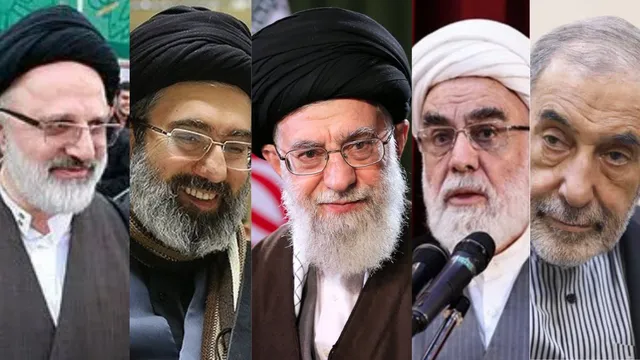- By Supratik Das
- Wed, 18 Jun 2025 03:10 PM (IST)
- Source:JND
Amid escalating tensions in the Middle East, Iran's Supreme Leader Ayatollah Ali Khamenei is now more than ever alone politically, militarily, and diplomatically. While Israeli airstrikes bomb Iranian military bases and senior commanders are killed, the question of who will succeed the 86-year-old leader has taken on new urgency. In an interview with ABC News, Israeli Prime Minister Benjamin Netanyahu asserted that the possibility of eradicating Khamenei could end decades of hostility between Iran and Israel. One day later, Israeli Defence Minister Israel Katz turned up the heat, issuing a warning that Khamenei might "end up like Saddam Hussein." US President Donald Trump allegedly vetoed an Israeli attempt to kill Khamenei but did not rule out doing so in the future. Speaking at a press conference, Trump stated, "There are no plans right now to kill him, but our patience is wearing thin. He's an easy target."
Khamenei’s inner circle has been devastated in recent Israeli strikes. Among those killed are Hossein Salami, IRGC Commander-in-Chief, Amir Ali Hajizadeh, head of Iran’s missile program; Mohammad Kazemi, Iran’s Intelligence Chief; Major General Ali Shadmani, military chief; Mohammad Bagheri, and nuclear scientists Fereydoun Abbasi and Mohammad Mehdi Tehni as well. The loss of these key figures has dealt a severe blow to Khamenei’s rule and raised serious concerns over leadership stability in Tehran.
Who Might Replace Khamenei?
Speculation is swirling over who might replace Khamenei if he is assassinated or dies a natural death. Under Iran's constitution, the next Supreme Leader would be selected by the Assembly of Experts, an 88-member clerical assembly. But internal factions and political alignments may make that process difficult. The Assembly of Experts may opt for a leadership council instead of a single Supreme Leader, especially if no clear successor emerges. Such a move could help balance power among Iran’s competing factions and maintain internal stability during a volatile period.
Mojtaba Khamenei:
Among the top contenders is Mojtaba Khamenei, the 55-year-old son of the Supreme Leader. The mid-ranking cleric with strong influence. Mojtaba has close affinities with the Islamic Revolutionary Guard Corps (IRGC) and is said to set key security and political strategies. While most think that Khamenei quietly prepared his son for the succession, a dynastic handover could be resisted strongly within Iran's conservative clerical ranks.
Ali Asghar Hejazi:
Ali Asghar Hejazi, another key figure in Iran's security structure, is another serious contender for this role. As the deputy for political-security affairs in the Supreme Leader's office, Hejazi has a strong oversight of national intelligence and strategic policy. Although not a cleric himself, his close relationship with Khamenei and extensive connections with both the IRGC and clerical establishment have established him as one of the most influential behind-the-scenes players in the Islamic Republic.
Mohammad Golpayegani:
Mohammad Golpayegani, the long-serving chief of staff to Khamenei, is another trusted aide with potential influence in the succession process. Known for his loyalty and discretion, Golpayegani has a detailed understanding of how the Supreme Leader’s office functions and has been instrumental in shaping Khamenei’s day-to-day leadership. While he has largely remained out of public view, his seniority within the system makes him a possible candidate or kingmaker in the transition.
Ali Akbar Velayati:
Ali Akbar Velayati, former foreign minister and senior adviser to Khamenei on foreign policy, offers both religious credibility and extensive diplomatic experience. As a long-time member of the Expediency Council, he has been central to shaping Iran’s foreign alliances. However, Velayati’s advancing age and recent health issues may weaken his candidacy.
Kamal Kharazi:
Kamal Kharazi, yet another former foreign minister, is the current leader of Iran's Strategic Council on Foreign Relations. A polished diplomat instrumental in the post-nuclear agreement era, Kharazi is viewed as being more moderate than the hardliners but remains within the confines of the system. English-fluent and respected internationally, he is also a contender who might appeal to groupings searching for stability and diplomacy.
Ali Larijani
Ali Larijani, the previous speaker of Iran's Parliament and former head of state television, is also still a name to watch. A member of a leading clerical family in Qom, Larijani is regarded as a pragmatist with conservative tendencies. His closeness to Khamenei and security apparatuses, as well as his independent credentials, may make him a compromise candidate in a split Assembly of Experts.
As Iran faces military attacks, economic sanctions, and internal opposition, the specter of succession weighs heavily on the international scene. Khamenei, in power since 1989, is still the ultimate authority of everything from foreign policy to nuclear policy. But as Israeli missilesstrike Tehran and pillars of trust are taken out, the regime's once ironclad grip on office begins to fray. With both the United States and Israel threatening further escalation, the next few days may determine the Islamic Republic'sand the region's future.

